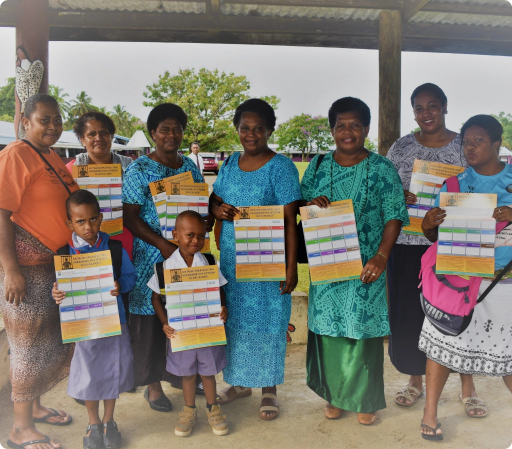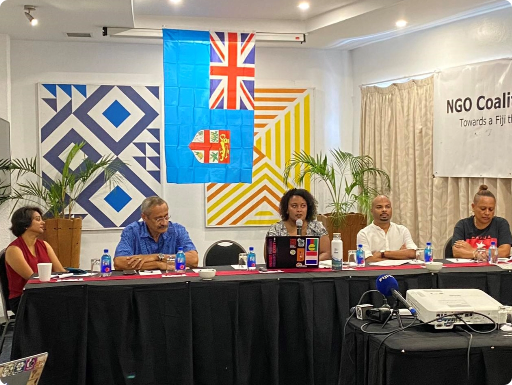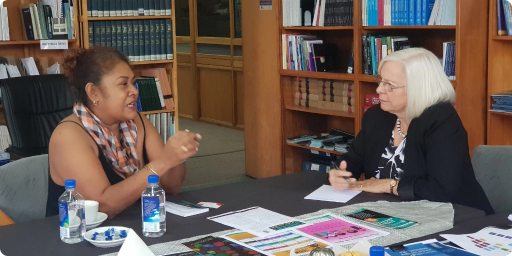- Accessibility:
- Text Size
Work of Commission
- Home
- Work of Commission

Role of the Human Rights and Anti-Discrimination Commission
The Human Rights and Anti-Discrimination Commission has the constitutional mandate of developing a culture of human rights in Fiji by promoting the protection, observance and respect for human rights in both public and private institutions. It does so by educating the public about their rights and freedoms, receiving and investigating alleged violations of human rights and taking steps to address these violations including conciliations and making application to court for redress, making recommendations to Government in relation to existing and proposed laws to ensure compliance with human rights standards as well as ensure compliance by the State in fulfilling its international human rights obligations with respect to international human rights treaties and conventions.
Human Rights Investigations
Complaints received and investigated by the Commission include allegations of violations of the constitutional right to:
- Right to life
- Right to personal liberty
- Rights of arrested and detained persons
- Freedom from cruel and degrading treatment
- Freedom from unreasonable search and seizure
- Rights of accused persons
- Access to courts or tribunals
- Freedom of association
- Freedom of religion, conscience and belief
- Right to executive and administrative justice
- Freedom of speech, expression and publication
- Freedom of movement and residence
- Right to equality and freedom from discrimination
- Employment relations
- Rights of children
- Right to privacy
- Access to information
- Right to education
- Right to health
- Rights of ownership and protection of iTaukei, Rotuman
- and Banaban lands
- Right to economic participation
- Right to housing and sanitation
- Right to adequate food and water
- Right to social security schemes
- Freedom from arbitrary evictions Rights of persons with disabilities
Complaints received by the Commission are also intersectional in nature such as deprivation of shelter for women with psychosocial disability and elderly persons, human trafficking, domestic violence, denial of access to justice for foreign nationals in detention, sexual assault of children and denial of prompt medical examination and treatment in such cases referred to the Commission by NGOs such as the Fiji Women’s Crisis Center, Empower Pacific and faith-based organisations.
The nature of complaints received by the Commission shows that the Commission does not privilege one set of rights over another whether they are civil or political or social, economic and cultural rights. The complaints demonstrate the interrelated, interdependent and indivisible nature of human rights.
The Commission’s newly developed case management system and human rights information ecosystem, funded through the Commonwealth Equality Initiative, will engender a greater ethos of accountability, transparency, responsiveness and integrity in handling complaints as well as assist in the production of veritable data for the purposes of treaty body reporting and strategic human rights interventions.
Monitoring Compliance
Monitoring places of detention
The Commission monitors places of detention including corrections facilities, police cell blocks, Department of Immigration safe house and hospitals and is working with the Fiji Corrections Service in implementing the minimum human rights standards in places of detention (Mandela Rules). It has facilitated human rights training for the Fiji Police Force and the FCS by securing the expertise of the Association of the Prevention of Torture (APT) and the United Nations Office of Drugs and Crime (UNODC).
“Human Rights Walls” in Police Stations
“Human rights walls” were established in police stations outlining the constitutional rights of arrested and detained persons at the Totogo Police Station as well as the Criminal Investigations Department and subsequently established in other police stations and community posts around Fiji. The Commission has translated and produced posters on the rights of arrested and detained persons in five languages: English, Itaukei, Hindi, Chinese and Rotuman.
First Hour Procedure
In partnership with the Fiji Police Force, the Judiciary, the Office of the Director of Public Prosecutions and the Legal Aid Commission, the Commission conducted training on the First Hour Procedure to ensure early access to justice and video recording of caution interviews to address concerns of cruel and degrading treatment and the rights of arrested and detained persons.
Remedy For Human Rights and Violations
Legal Proceedings
The Commission has instituted legal proceedings and appeared as amicus curiae in court to uphold human rights principles, ensuring appropriate redress or remedies are afforded to the victims of human rights violations.
- The Commission instituted proceedings in the High Court after investigating a complaint of arbitrary detention of a ten-year-old in a police station. The child was awarded $25,000 by the High Court of Fiji.
- In another matter, a complainant was paid $40,000 in an out of court settlement initiated by the Commission for being arbitrarily detained.
- The Commission intervened in a case of police brutality resulting in death as well as requested for inquest in the case of a death in police custody.
- A case in relation to the rights of children is before the Supreme Court of Fiji.
The Commission has instituted proceedings in the restitution of:
- Rights of arrested and detained persons and in particular the unlawful detention of children (Section 13)
- Freedom from cruel and degrading treatment (Section 11)
- Rights of accused persons (Section 14)
- Right to Freedom from Arbitrary Eviction (Section 39) & Rights of Children (Section 41)
- Right to Freedom from Cruel and Degrading Treatment & Rights of Arrested and Detained Persons (Section 11 and Section 13)
- Access to Courts or Tribunals (Section 15(10
- Rights to Life (Section 8)
- The Commission also requested for an inquest in relation to death in police custody of an 18-year-old.
Alternative Human Rights Reports
Universal Periodic Review (UPR) Report
The Commission submitted an alternative report on the third cycle of Fiji’s Universal Periodic Review. The report expounds on the constitutional and legislative framework governing the national human rights institution, charts its progress towards regaining its accredited status as a national human rights institution that is in compliance with the Paris Principles, and outlines the key initiatives undertaken by the Commission in fulfilling its constitutional mandate. It also appraises the State’s fulfilment of its human rights obligations following its last review in 2014 and concludes with recommendations that the Commission considers will help further strengthen Fiji’s human rights landscape.
CEDAW Report
An alternative report on the implementation of the Convention on the Elimination of All Forms of Discrimination against Women (CEDAW) in Fiji was submitted to the CEDAW Committee in 2018.
LGBTQI Report
A report was submitted to Asia Pacific Forum of National Human Rights Institutions, on the two-day National Consultation on the human rights of LGBTQI persons in Fiji.
Engagement With Civil Society & Development Partners
The Commission has constructively engaged with diverse groups including the UN agencies such as UNDP, OHCHR, the European Union, Asia-pacific Forum of National Human Rights Institutions, and International Red Cross. It is working with the Judiciary, Fiji Police Force, Fiji Correction Services and, statutory bodies such as the Legal Aid Commission and the Fijian Elections Office, Fijian Competition and Consumer Commission and Accident Compensation Commission Fiji.
The Commission has engaged with civil society organisations such as Fiji Disabled Peoples Federation, Fiji Women’s Rights Movement, Citizens Constitutional Forum, National Council of Women Fiji, DIVA, Diverse Voices and Action for Equality Fiji, Fiji Women’s Crisis Centre, Soqosoqo Vakamarama, Fiji National Council for Disabled Persons, Youth Champs 4 Mental Health, Provincial Youth Forum of Fiji Islands, Pacific Centre for Peace Building, Dialogue Fiji, Rainbow Pride Foundation, Haus of Khameleon, Strumphet Advocacy Network , Pacific Rainbow Advocacy Network, Survival Advocacy Network together with UNDP through public consultations held throughout Fiji on a number of human rights issues such as the first hour procedure and the rights of arrested and detained persons, LGBTI rights, rights of sex workers, racism, rights of persons with disabilities, rights of children in conflict with the law, freedom of expression and women’s right to economic participation.

The Commission in collaboration with Fiji Disabled Peoples Federations visited villages in Central and Western divisions reaching out to Fijians, advocating on rights of persons with disabilities and access to justice.
The Commission in collaboration with the Association for the Prevention of Torture (APT) and UNDP facilitated training for the Fiji Corrections Service on the United Nations Standard Minimum Rules for the Treatment of Prisoners (the Nelson Mandela Rules) and on the purpose and procedure of inspections of places of detention. The Commission also collaborated with OHCHR, raising awareness on use of proportionate force with Fiji Police Force and on principles of non-discrimination.
Accreditation and Compliance with Paris Principles

The Commission is fully committed towards ensuring compliance with the Paris Principles and has been working with the Asia-Pacific Forum of National Human Rights Institutions (APF) and the Global Alliance of National Human Rights Institutions (GANHRI). To that end, in early 2020, the Commission underwent a capacity assessment with APF, United Nations Development Programme (UNDP) and Office of High Commissioner for Human Rights (OHCHR).
Accreditation
Having lost its accredited status in 2007, the Global Alliance of National Human Rights Institutions (GANHRI) at its June 2021 session reviewed the compliance of the Human Rights and Anti-Discrimination Commission with the Paris Principles and recommended that the Commission be accredited with B status. The accreditation outcome is a fantastic result for human rights in Fiji and sends a message that the Commission is operating in accordance with international standards. Accreditation with GANHRI will also enable the institution to join global and regional human rights bodies, including the Asia Pacific Forum of National Human Rights Institutions. The recommendations issued by the GANHRI’s Subcommittee on Accreditation indicate few concerns with technical aspects of the Commission’s legal mandate.
The outcome of the accreditation review illustrates that the Commission is functioning independently n practice and is discharging the full breadth of its mandate to promote and protect human rights across Fiji. The Commission will continue to strengthen its policies and guidelines to ensure compliance with requirements set under Paris Principles.

